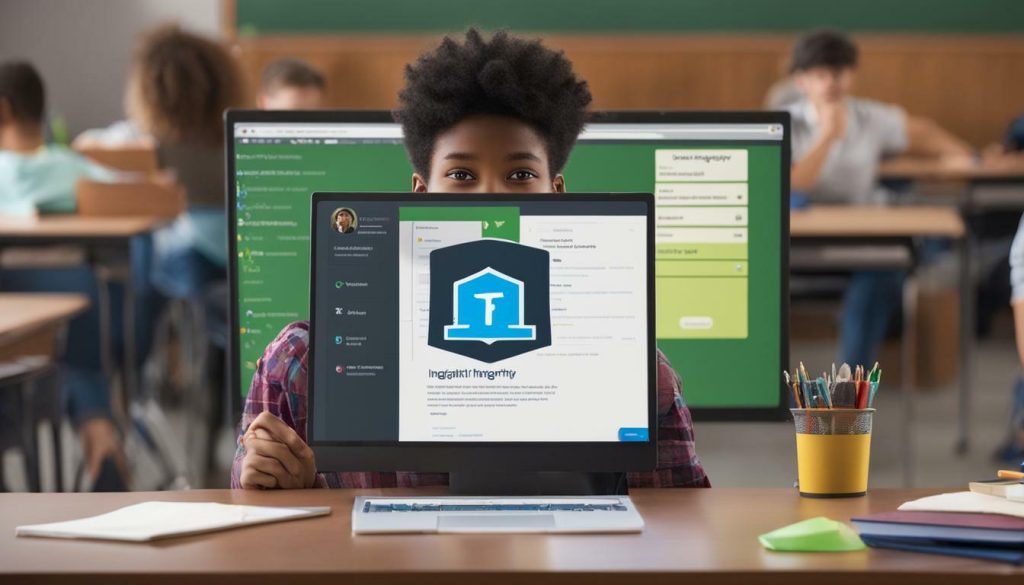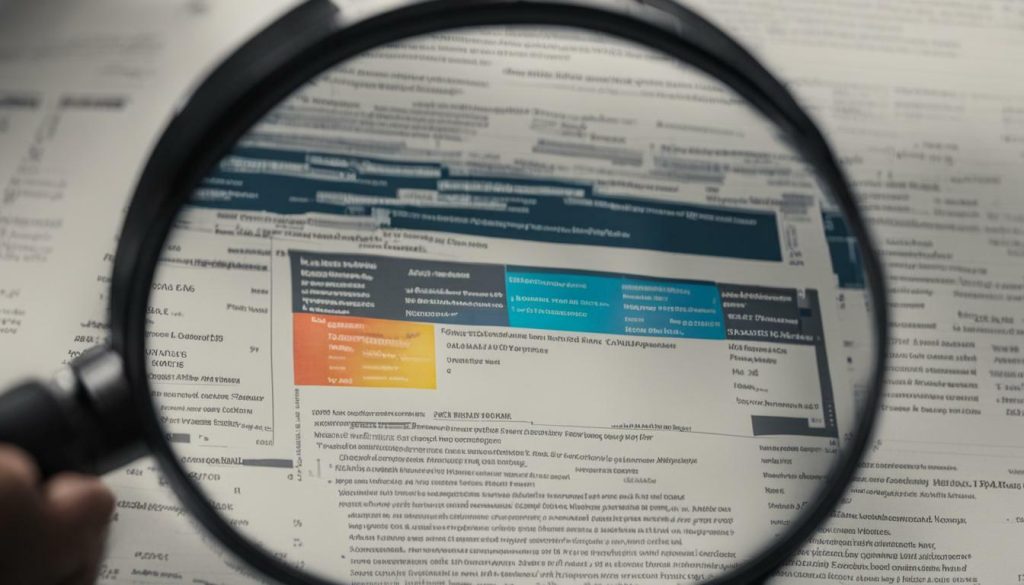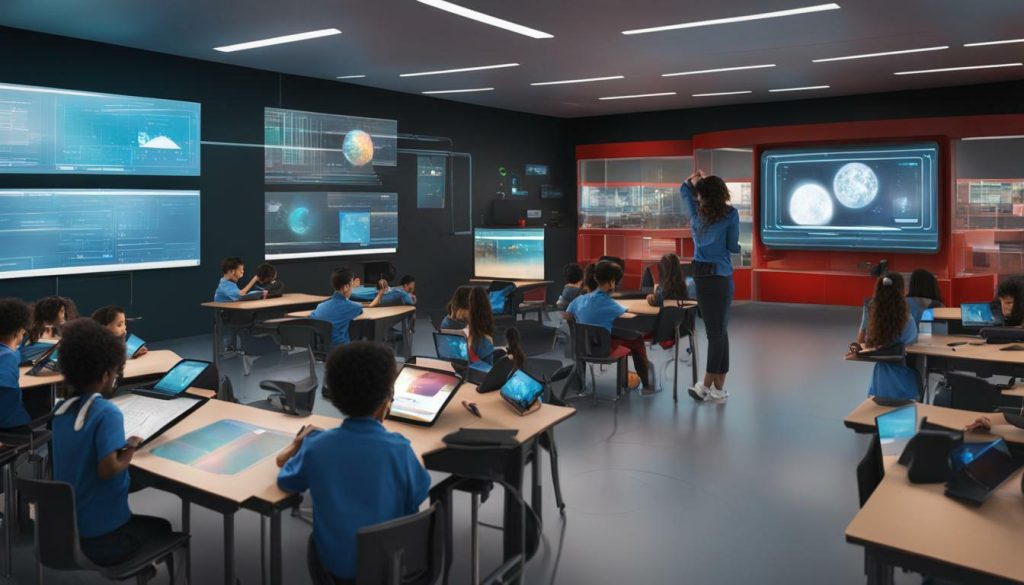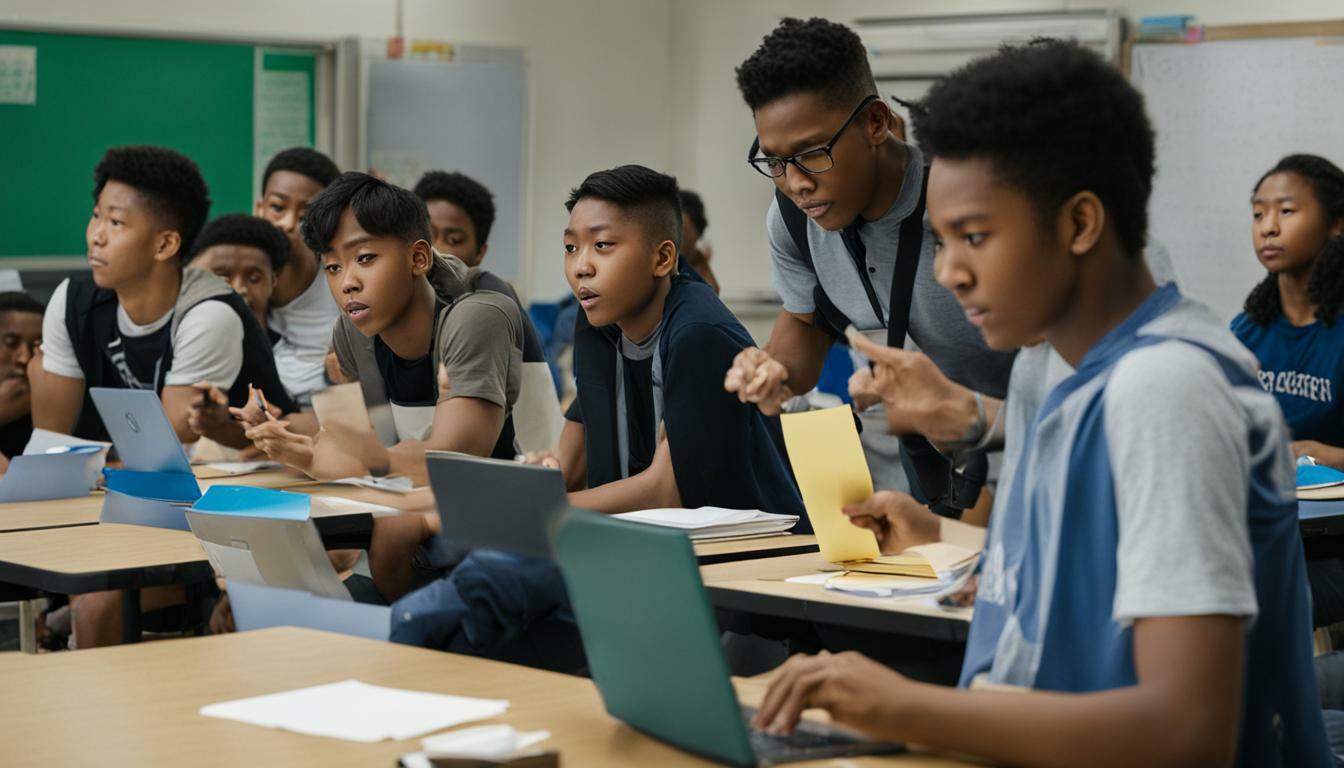Academic integrity is a fundamental aspect of education, and it is crucial for students to demonstrate that ChatGPT was not used in their work, especially in South African educational settings. With the increasing use of AI tools like ChatGPT, educators face the challenge of preventing cheating and maintaining credibility. In this article, we will explore strategies, tools, and emerging solutions that can help ensure academic integrity in the presence of ChatGPT.
- Promote critical thinking, originality, and collaboration to reduce the likelihood of ChatGPT usage for cheating purposes.
- Design assignments that align with students’ future professions to deter misuse and promote responsible usage of ChatGPT.
- Utilize tools such as plagiarism detection software, peer-review sessions, and clear guidelines on citation practices to maintain academic integrity.
- Incorporate innovative assessment strategies like reflective evaluation, varying word counts, group work, and hypothetical case studies to prevent cheating.
- Implement additional measures such as the use of multimedia artifacts, clear grading rubrics, and restricted reference materials to safeguard academic integrity.
As the usage of ChatGPT raises concerns about academic integrity, educational institutions are developing policies and engaging in transparent conversations with students. Efforts are underway to establish recommended practices and academic integrity policies that discourage heavy reliance on AI tools. Additionally, emerging solutions like applications are being developed to detect ChatGPT-generated texts and ensure the credibility of outputs.
In conclusion, academic integrity remains a crucial aspect of education, and it is essential for students to demonstrate that ChatGPT was not used in their work. By implementing strategies, utilizing tools, and developing policies, educational institutions can maintain rigorous scientific standards and instill a culture of integrity in South African educational settings.
Strategies for Promoting Academic Integrity
To maintain academic integrity and ensure credibility, educators can implement strategies such as promoting critical thinking, encouraging originality, and fostering collaboration among students. By emphasizing these key aspects, educational institutions can create an environment that discourages cheating and enhances the learning experience.
Promoting Critical Thinking
Critical thinking is a fundamental skill that allows students to analyze, evaluate, and synthesize information effectively. By incorporating assignments and assessments that require higher-order thinking, educators can promote intellectual growth and reduce the temptation to rely on AI tools like ChatGPT. Encouraging students to question assumptions, evaluate evidence, and think independently fosters a culture of academic integrity.
Encouraging Originality
Originality is essential for academic success and intellectual advancement. By highlighting the value of unique ideas, educators can discourage plagiarism and improper use of AI tools. Assignments that encourage students to express their own thoughts, conduct original research, and cite sources correctly not only promote academic integrity but also enhance students’ ability to contribute to the knowledge pool of their respective disciplines.
Fostering Collaboration
Collaboration plays a vital role in the educational process. By encouraging students to work together on projects, discuss ideas, and provide constructive feedback, educators can create a supportive and inclusive learning environment. Collaborative activities not only promote academic integrity by discouraging individual cheating but also enhance students’ ability to communicate effectively, think critically, and learn from one another.
In order to ensure academic integrity, educators must combine these strategies and design assessments and assignments that align with the learning outcomes of their courses. By promoting critical thinking, encouraging originality, and fostering collaboration, educational institutions can create an environment that values integrity and prepares students for success in their future professions.
| Benefits of Promoting Academic Integrity | Examples |
|---|---|
| Promotes a culture of trust and fairness | Assignments that require critical analysis instead of simple regurgitation of information. |
| Enhances students’ ethical decision-making skills | Group projects that emphasize collaboration and communication. |
| Prepares students for real-world challenges | Assignments that simulate professional scenarios and require problem-solving skills. |
“Promoting academic integrity not only ensures fairness in the evaluation process but also cultivates essential skills that students need to succeed in their future careers.” – Dr. Jane Smith, Academic Integrity Specialist

By implementing strategies that promote critical thinking, encourage originality, and foster collaboration, educators can maintain academic integrity and ensure credibility in the face of AI tools like ChatGPT. These strategies not only deter cheating but also enhance students’ learning experience and prepare them for the challenges of their future professions.
Designing Assignments to Prevent ChatGPT Misuse
Designing assignments that incorporate ChatGPT usage in a manner consistent with students’ future profession can be an effective approach to prevent misconduct and ensure ethical usage. By aligning the tasks with real-world applications, educators can encourage responsible and purposeful utilization of AI tools like ChatGPT.
One strategy is to assign projects that require students to use ChatGPT as a tool for research and analysis. For example, in a journalism course, students can be tasked with utilizing ChatGPT to generate interview questions for an imaginary celebrity interview. This not only enhances their writing skills but also provides an opportunity to explore the capabilities and limitations of AI technology.
Collaborative assignments can also deter misconduct by emphasizing teamwork and collective learning. For instance, in a design class, students can work in groups to create multimedia presentations using ChatGPT-generated content. This approach encourages students to exchange ideas, critically evaluate AI-generated content, and verify information from different perspectives.
| Benefits of Designing Assignments to Prevent ChatGPT Misuse: |
|---|
|
By integrating ChatGPT into assignment designs, educators can create a learning environment that fosters creativity, critical thinking, and responsible usage. The key is to emphasize the authentic application of ChatGPT aligned with students’ future professions, ensuring that its use complements their learning journey rather than serving as a shortcut to academic success.

Tools and Techniques for Maintaining Academic Integrity
Ensuring academic integrity in the context of ChatGPT usage is a concern for educators. Employing tools like plagiarism detection software, conducting peer-review sessions, and providing clear guidelines on citation practices are essential in upholding academic integrity with the use of ChatGPT. These tools not only serve as preventative measures but also enable educators to identify potential instances of misconduct.
Plagiarism detection software plays a crucial role in detecting any plagiarized content that may have been generated using ChatGPT. By comparing student submissions with a vast database of sources, this software can identify similarities and flag any potential cases of plagiarism. Integrating regular checks with this software helps maintain fairness and accountability, ensuring that students are submitting original work.
Peer-review sessions are another effective method for promoting academic integrity. By encouraging students to evaluate and provide feedback on each other’s work, these sessions foster a sense of responsibility and collaboration. In this process, students can identify instances where ChatGPT may have been misused and provide valuable insights to improve the quality and originality of their peers’ work.
| Citation Practices | Academic Integrity |
|---|---|
| Provide clear guidelines on proper citation practices. | Emphasize the importance of acknowledging sources and giving credit to the original authors. |
| Encourage students to critically evaluate and analyze the sources they use. | Guide students in understanding the ethical implications of plagiarism and the importance of maintaining academic integrity. |
By implementing these tools and techniques, educators can create an environment that promotes academic honesty and discourages the misuse of ChatGPT. However, it is essential to remember that these measures should work in conjunction with broader educational strategies. The goal is not to eliminate the use of ChatGPT entirely, but rather to ensure its responsible application within the educational framework.

Plagiarism is a serious offense and can lead to severe consequences, both academically and professionally. It undermines the integrity of the education system and diminishes the value of individual achievements. It is crucial for educators and institutions to actively combat this issue and equip students with the necessary skills to navigate the digital landscape responsibly.
Innovative Assessment Strategies to Prevent Cheating
By implementing assessment strategies such as reflective evaluation, varying word counts, engaging in group work, and analyzing hypothetical case studies, educators can minimize the potential for cheating through ChatGPT. These strategies promote critical thinking, originality, and collaboration, fostering a learning environment that discourages academic misconduct and encourages students to demonstrate their own knowledge and skills.
One effective assessment strategy is reflective evaluation, which requires students to critically reflect on their own work and provide thoughtful analysis of their thought processes and decision-making. This encourages students to demonstrate a deep understanding of the subject matter and enhances their ability to express their unique perspectives.

Another strategy is to vary word counts for assignments. By assigning tasks with specific word limits, educators can ensure that students are able to convey their thoughts concisely and accurately. This prevents over-reliance on ChatGPT for generating lengthy and potentially irrelevant content, encouraging students to engage with the material and think critically about the information they provide.
Engaging students in group work is a valuable assessment strategy that promotes collaboration and discourages individual cheating. By assigning group projects or discussions, educators encourage peer interaction and shared responsibility, making it more difficult for students to rely solely on ChatGPT for answers. Group work also cultivates communication and teamwork skills, which are essential in real-world professional settings.
Finally, incorporating hypothetical case studies into assessments provides an opportunity for students to apply their knowledge and problem-solving skills in realistic scenarios. This type of assessment challenges students to think creatively and analytically, making it less likely for them to rely on ChatGPT for quick and generic answers. It also allows educators to evaluate students’ ability to think critically and make informed decisions based on their understanding of the subject matter.
By utilizing these innovative assessment strategies, educators can create a learning environment that promotes academic integrity and reduces the temptation to misuse ChatGPT for cheating purposes. These strategies not only help prevent cheating but also foster critical thinking, originality, collaboration, and real-world application of knowledge, ensuring that students develop the necessary skills for success in their future professions.
Additional Measures to Safeguard Academic Integrity
Enhancing academic integrity can be achieved by incorporating multimedia artifacts, utilizing clear grading rubrics, and imposing restrictions on reference materials in assignments involving ChatGPT. These measures not only discourage cheating but also promote responsible usage of AI tools in educational settings.
By incorporating multimedia artifacts into assignments, educators can encourage students to think creatively and demonstrate their understanding of concepts in innovative ways. This can include creating videos, podcasts, or interactive presentations that showcase their research and analysis. Such artifacts not only add depth and engagement to assignments but also make it difficult for students to rely solely on ChatGPT-generated text, as the inclusion of multimedia elements requires a comprehensive understanding of the subject matter.
Utilizing clear grading rubrics is another effective strategy to maintain academic integrity. By outlining specific criteria and expectations for assignments, educators can provide students with a transparent framework for evaluation. This enables students to clearly understand what is required of them and reduces the likelihood of using ChatGPT to plagiarize or shortcut their work. Additionally, by aligning grading rubrics with the learning outcomes of the assignment, educators can assess critical thinking skills, originality, and collaboration, further discouraging reliance on AI tools for unethical purposes.
Implementing clear guidelines and restrictions on reference materials is crucial in preventing academic misconduct. By specifying the permitted sources of information, educators can ensure that students engage in independent research and avoid the temptation to use ChatGPT as a shortcut. Restricting reference materials to peer-reviewed articles, textbooks, and reliable online sources with imposed limitations on internet access during assignments can help foster a genuine learning experience and encourage students to develop their own analysis and interpretations.
By implementing these additional measures, educators can create a learning environment that encourages academic integrity and promotes the development of critical thinking skills. While AI tools like ChatGPT can be valuable resources, it is essential to establish clear boundaries and expectations to ensure their responsible and ethical usage in educational settings.
Table 1: Benefits of Incorporating Multimedia Artifacts
| Benefits | Explanation |
|---|---|
| Creativity | Multimedia artifacts allow students to showcase their understanding of concepts in innovative ways, fostering creativity. |
| Depth | The inclusion of multimedia elements adds depth to assignments, requiring a comprehensive understanding of the subject matter. |
| Engagement | Students are more engaged when they can utilize various mediums to express their ideas and findings. |

Addressing Concerns and Developing Policies
In response to the introduction of ChatGPT, educational institutions in South Africa are actively addressing concerns by developing academic integrity policies, recommending best practices, and fostering transparent conversations with students. The aim is to ensure that the use of ChatGPT aligns with rigorous scientific standards and maintains the integrity of the academic environment.
These efforts include the development of academic integrity policies that outline the expectations and consequences related to ChatGPT usage. These policies provide guidelines for students, educators, and administrators, emphasizing the importance of originality, critical thinking, and responsible use of AI tools like ChatGPT. By establishing clear policies, institutions can set the standard for maintaining academic integrity in South African educational settings.
Recommended practices are also being implemented to support students and educators in navigating the use of ChatGPT. Institutions are promoting transparent conversations with students, engaging them in discussions about the ethical implications of AI, and encouraging them to report any instances of misconduct. These conversations foster a culture of academic honesty and provide students with the opportunity to develop a deeper understanding of the importance of integrity in their academic journey.
Table: Academic Integrity Policies
| Institution | Policy Summary |
|---|---|
| University of Cape Town | The university’s policy emphasizes the importance of originality and proper citation practices. It provides guidelines for faculty and students on how to responsibly use AI tools like ChatGPT while maintaining academic integrity. |
| University of Pretoria | The university’s policy includes regular integrity checks, emphasizes the development of critical thinking skills, and provides resources for students to learn how to effectively use ChatGPT for research without compromising academic honesty. |
| Stellenbosch University | The university’s policy highlights the significance of collaboration and the responsible use of AI tools in group work. It encourages students to actively engage in discussions about the ethical implications of AI in order to promote a culture of academic integrity. |
As South African institutions continue to address concerns surrounding ChatGPT and its impact on academic integrity, it is crucial to develop comprehensive policies and engage in ongoing conversations to ensure transparency and maintain scientific standards. By doing so, educational institutions can create an environment that upholds the values of integrity, originality, and critical thinking, fostering the growth and development of students in their academic pursuits.

Efforts are underway to develop applications that can detect the usage of ChatGPT and identify ChatGPT-generated texts, although their coverage and effectiveness are still being developed. With the growing concerns surrounding academic integrity, it is crucial to have tools that can help educators identify instances of ChatGPT misuse. These applications aim to provide a safeguard against the use of AI-generated content in academic settings, ensuring that students are held accountable for their own work and promoting a fair learning environment.
One approach being explored is the use of machine learning algorithms to analyze writing patterns and identify characteristics unique to ChatGPT-generated texts. By comparing student submissions to a database of known ChatGPT outputs, these applications can flag suspicious content and alert educators for further investigation. This can help detect cases where students rely on AI tools to complete assignments, minimizing the risk of academic misconduct.
Another aspect being considered is the development of plagiarism detection software specifically designed to identify ChatGPT-generated content. These tools analyze text similarity and cross-reference it with known ChatGPT outputs, providing a more targeted approach to detecting AI-generated plagiarism. By incorporating ChatGPT-specific algorithms into existing plagiarism detection systems, educators can better identify instances where students have relied on AI to produce their work.
While these emerging solutions show promise, it is important to acknowledge that they are still in the developmental stage. Coverage and effectiveness may vary, and further research and refinement are needed to ensure robust detection capabilities. As the field progresses, it is expected that these applications will become more comprehensive and accurate, providing educators with the necessary means to combat academic misconduct.

| Pros | Cons |
|---|---|
| Improved detection of ChatGPT usage | Developmental stage with varying effectiveness |
| Promotes academic integrity | Further research and refinement required |
| Enhances accountability for students | May require additional training for educators |
Conclusion
Academic integrity is paramount in educational settings, and as students navigate the use of AI tools like ChatGPT, it becomes crucial to establish methods for proving that ChatGPT was not utilized, ensuring credibility, and upholding ethical standards. To mitigate cheating and promote academic integrity, educators can employ various strategies.
Promoting critical thinking, originality, and collaboration are essential for fostering a culture of academic honesty. By designing assignments that require students to use ChatGPT effectively in ways consistent with their future profession, educators can deter misuse and encourage responsible usage.
Additional tools and techniques such as plagiarism detection software, peer-review sessions, and clear guidelines on citation practices can help maintain academic integrity. These measures not only deter misconduct but also provide students with a framework to understand and practice ethical research.
Moreover, innovative assessment strategies can be employed to prevent cheating and reduce the temptation to rely on ChatGPT for academic tasks. Assessments that focus on reflective evaluation, varying word counts, group work, and hypothetical case studies encourage critical thinking and discourage the use of AI tools for shortcuts.
However, it is not only the responsibility of educators to ensure academic integrity. Institutions should consider implementing additional measures such as the use of multimedia artifacts, clear grading rubrics, and restricted reference materials. These measures provide students with guidance and set clear expectations for their work.
As the introduction of ChatGPT raises concerns about maintaining academic integrity, it is crucial for educational institutions to address these concerns through policies and transparent conversations with students. By engaging in open dialogue and reevaluating assessment strategies, institutions can uphold rigorous scientific standards and prevent heavy reliance on AI tools like ChatGPT.
Furthermore, emerging solutions are being developed to identify ChatGPT usage and detect ChatGPT-generated texts. While these applications are still in their early stages and their coverage and effectiveness are being refined, they hold promise in maintaining academic integrity in the digital age.
In conclusion, academic integrity is a collective effort that requires the commitment of both educators and institutions. By implementing a combination of strategies, tools, and techniques, we can create an environment that promotes honesty, critical thinking, and responsible use of AI tools like ChatGPT.
FAQ
How can students prove that ChatGPT was not used to maintain academic integrity?
Students can maintain credibility by ensuring their work demonstrates critical thinking, originality, and collaboration. They should follow assignment guidelines that require effective use of ChatGPT within the context of their future profession.
What strategies can educators employ to promote academic integrity and reduce ChatGPT usage for cheating purposes?
Educators can promote academic integrity by encouraging critical thinking, fostering originality, and facilitating collaboration among students. Assignments and assessments can be designed to deter ChatGPT misuse and ensure responsible usage.
How can assignments be designed to prevent students from misusing ChatGPT?
Assignments should be designed to require students to effectively utilize ChatGPT in ways that align with their future profession. By incorporating tasks that reflect real-world scenarios and industry expectations, students are less likely to misuse ChatGPT for cheating purposes.
What tools and techniques can be used to maintain academic integrity in the context of ChatGPT usage?
Plagiarism detection software, peer-review sessions, and clear guidelines on citation practices and academic integrity are valuable tools. These measures help prevent misconduct and ensure that students are held accountable for their work.
What innovative assessment strategies can be implemented to prevent cheating and discourage ChatGPT usage?
Assessment strategies such as reflective evaluation, varying word counts, group work, and hypothetical case studies can reduce the potential for cheating. By incorporating these strategies, students are encouraged to showcase their own understanding and original thinking instead of relying on ChatGPT.
What additional measures can be taken to safeguard academic integrity in the presence of ChatGPT?
Using multimedia artifacts, implementing clear grading rubrics, and restricting the use of reference materials can contribute to maintaining academic integrity. These measures create a structured and fair evaluation process that discourages reliance on ChatGPT-generated content.
How are educational institutions addressing concerns raised by the introduction of ChatGPT?
Educational institutions are developing academic integrity policies and engaging in transparent conversations with students about the responsible use of ChatGPT. They are also reevaluating assessment strategies to ensure rigorous scientific standards and prevent heavy reliance on AI tools.
Are there any solutions emerging to identify ChatGPT usage and detect ChatGPT-generated texts?
Yes, applications are being developed to detect ChatGPT usage and identify ChatGPT-generated texts. However, the coverage and effectiveness of these applications are still under development.
What is the importance of maintaining academic integrity in the context of ChatGPT usage?
Maintaining academic integrity is crucial to ensuring credibility, rigor, and fairness in education. It upholds ethical standards and fosters genuine learning experiences for students, even in the presence of AI tools like ChatGPT.

